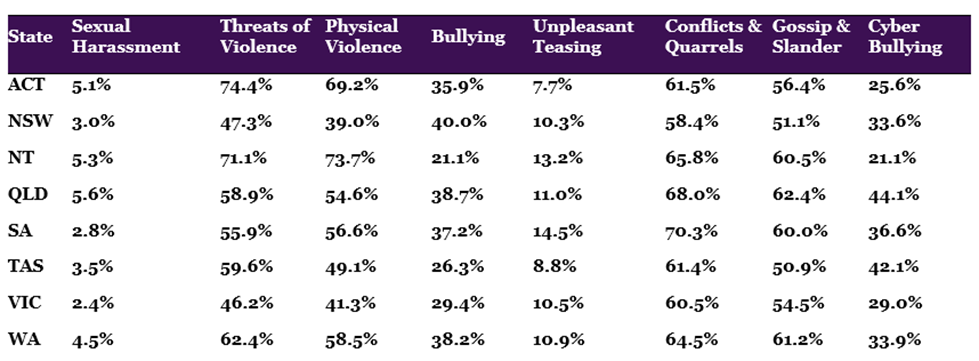
Australia’s school leaders are reporting worsening levels of anxiety and depression as they continue to face high levels of physical violence, threats, and bullying, new research shows.
Released today, the Australian Principal Occupational Health, Safety and Wellbeing Survey, compiled by ACU’s Institute for Positive Psychology and Education (IPPE), found more than half (53.2%) of principals surveyed signalled an intention to quit – the figure jumped to 82.3% for those with low job satisfaction. A higher percentage of people who signalled an intent to quit and had low job satisfaction reported severe anxiety.
The authors of the report say the data points to “a substantial reduction” in experienced school leadership which will exacerbate existing teacher shortages and create a nationwide leadership vacuum, placing further strain on an already overburdened education system.
It also reveals instances of physical violence increased by 81.6% since the survey started in 2011. Threats of violence are also at their highest since inception.
Offensive behaviours towards principals escalated in 2024, with 49.6% subjected to physical violence and more than half (54.5%) experiencing threats of violence. Of those reporting threats of violence, 80.4% were at the hands of students.
Workloads and time constraints remain biggest stressors
Heavy workloads and a lack of time to focus on teaching and learning remained the top two sources of stress for principals surveyed in 2024. Student-related issues, followed by mental health of staff and the mental health of students round out the top five sources of stress.

‘No leader should have to endure this just to do their job’
Survey co-lead investigator Professor Herb Marsh said Australian principals are facing escalating challenges that threaten their well-being, their ability to lead effectively, and ultimately, the quality of education in our schools.
“The survey shows us that workload – the sheer quantity of work that school leaders have on their plates – and a lack of time to focus on teaching and learning – the core business of these dedicated educators – have been the top two sources of stress since we started the survey in 2011,” Professor Marsh told The Educator.
“This must change so principals can have the time and the flexibility to lead their schools and support their staff to achieve greater student learning and achievement.”
Professor Marsh said threats, physical violence, and public slander against school leaders have reached an all-time high, “creating an environment of fear and hostility.”
“The consequences are devastating — principals now report significantly higher levels of anxiety and depression than the general population,” he said.
“No leader should have to endure this just to do their job. We must support them in being the healthiest and happiest versions of themselves to effectively lead and inspire educators, students, and school systems to thrive.”
‘Policymakers are paying closer attention’
Co-lead investigator, Associate Professor Theresa Dicke said this year’s report does show some encouraging signs of progress, though they remain fragile.
“One of the more promising developments has been the Federal Minister for Education convening advisory meetings with peak principal associations to address long-standing concerns,” Associate Professor Dicke told The Educator.
“This is a direct response to the findings of this project over the years, and while it’s too early to measure its full impact, it signals that policymakers are paying closer attention.”
Additionally, Associate Professor Dicke said, there has been a slight reduction in reports of severe depression among school leaders compared to last year.
“This doesn’t mean the problem is solved — anxiety and overall mental health challenges remain serious concerns—but any sign of improvement is worth noting,” she said. “That said, progress needs to be more than incremental.”
Associate Professor Dicke said workload, workplace violence, and ongoing teacher shortages continue to weigh heavily on school leaders.
“Without a more coordinated and urgent response, we risk losing a generation of experienced leaders who are vital to the future of education in Australia.”
Bipartisan support for principals critical as election looms
ACU investigator and former principal Dr Paul Kidson said policy makers must continue to engage directly with principal associations and teacher representatives to reduce burdensome administration.
“Time for teaching and learning continues to be limited as more and more is asked of schools. An honest conversation about how to reconfigure the work of school leadership is needed,” Dr Kidson told The Educator.
“Other models such as co-principalship are growing, and these will require shifts of community expectations for them to become accepted, too. We continue to call on the wider community to be supportive of the work of their schools, for the sake of teachers and school leaders.”
Dr Kidson said there remains too much anti-social and negative behaviour directed at teachers and school leaders, adding that this is not appropriate in any workplace.
“Failure to address this will lead to increasing psychosocial workplace injuries among teachers and school leaders. This would be devastating for those involved, as well as for the nation,” he said.
“We strongly argue that employers should support the opportunity for reflective supervision for principals. This is where a trusted, confidential, and experienced colleague provides principals with time to reflect on their work and their health.”
Dr Kidson pointed out that other professions such as psychologists and counsellors have this as a requirement of their work.
“We call on its inclusion for school leaders,” he said.
“I’m cautiously optimistic about some of the emerging changes. The Better and Fairer Schools Agreement has student, teacher, and school leader well-being at its core, and the increase in funding is welcomed.”
However, Dr Kidson said that in the shadow of an election, it is important there is bi-partisan support to ensure these “green shoots” continue to grow.
“State initiatives, such as NSW’s ‘Audit of Administrative Tasks’ and Queensland’s ‘No Excuse for School Abuse’, are steps in the right direction, but these efforts need to be accelerated.”


